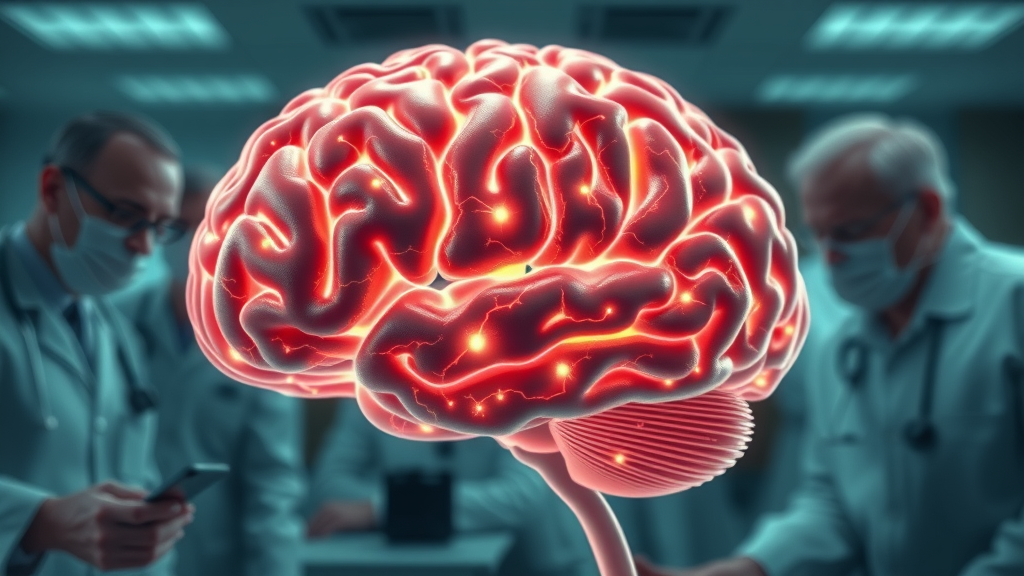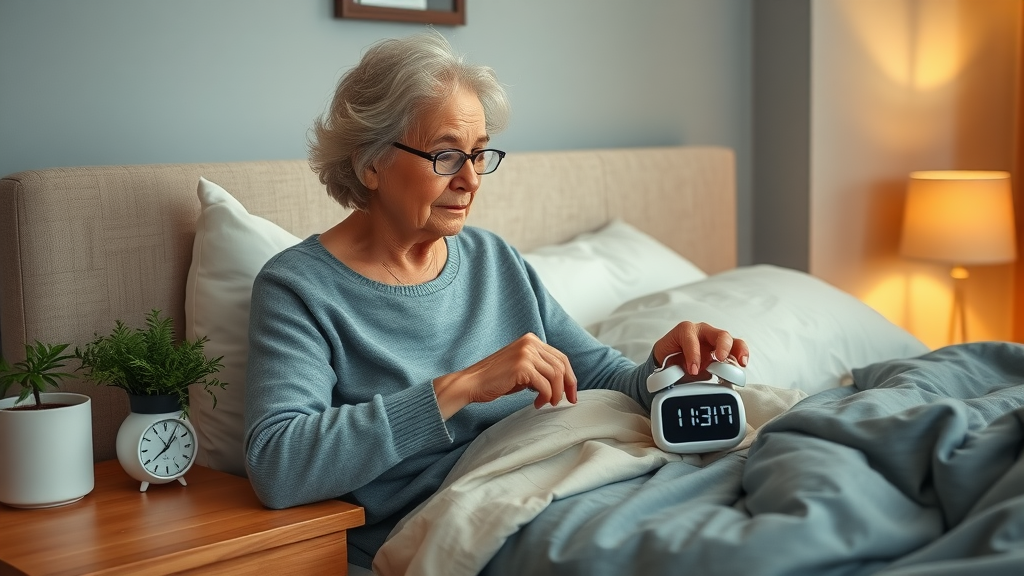- Did you know that up to 50% of older adults experience sleep problems, directly impacting brain health? Uncover the surprising truth about the impact of sleep on senior brain health—and why getting enough rest might be more crucial to cognitive longevity than you ever imagined.

Understanding the Profound Impact of Sleep on Senior Brain Health
- Explore how the impact of sleep on senior brain health is fundamentally reshaping aging science. Real-world stories and pivotal studies reveal clear connections between restful sleep and enhanced cognitive function in older adults.
The impact of sleep on senior brain health is no longer a subtle topic reserved for specialists—it's an undeniable pillar in aging science. What was once considered mere "rest" is now recognized as one of the most critical determinants of cognitive vitality and longevity as we age. Groundbreaking studies reveal that restful sleep, particularly among older adults, is connected with improved memory retention, quicker problem-solving, and even greater resilience against mental decline.
For example, research by major institutions has shown that seniors who consistently enjoy quality sleep score higher on cognitive tests and display fewer signs of early-stage dementia. Real-life stories mirror the science: older adults who prioritize sleep often describe sharper focus and emotional balance. As the science advances, evidence piles up—making it clear that addressing the impact of sleep on senior brain health is not just a lifestyle choice, but a necessary strategy for anyone hoping to maintain peak cognitive function well into their golden years.
Why Sleep Matters: The Neurological Link Between Sleep and Brain Health in Seniors

The neurological connection between sleep and brain health in seniors runs deeper than a good night's rest. During REM sleep and slow-wave sleep cycles, the brain enters recovery phases that are crucial for memory consolidation and toxin removal. Inadequate or poor sleep disrupts these phases—leaving behind residue that may accelerate aging and cognitive decline in older adults.
In particular, the circadian rhythm —the body’s internal clock—plays a major role in regulating the sleep cycle and, by extension, cognitive function. Disrupted circadian rhythms are common as we age, leading to increased risks for conditions such as cognitive impairment and dementia. The evidence suggests a direct association between high-quality sleep and sharp, resilient brain health.
REM Sleep: Its Critical Role in Maintaining Brain Health for Older Adults
REM sleep is essential for older adults because it's when the brain processes emotions and stores new memories. Unlike young adults, seniors naturally spend less time in REM sleep—which means that any further reduction can have immediate negative effects on cognitive function. Studies have linked diminished REM cycles not just with poor sleep , but also with greater risk for neurodegenerative diseases.
Further, experts have shown that during REM, there’s an uptick in eye movement and neurological activity that boosts learning and emotional stability. This phase also aids in overnight brain cleanup by assisting the glymphatic system in flushing out toxins. Disrupted REM is a significant risk factor for cognitive decline, specifically in older adults, underscoring why targeted efforts to improve sleep are vital.
Circadian Rhythm and Brain Health: How Circadian Rhythms Influence Cognitive Function

Our circadian rhythms ebb and flow with exposure to light and routine—guiding not just sleep, but mood, hormone release, and appetite. In older adults, circadian rhythms often drift out of sync, whether from lifestyle changes or physiological aging, making it harder to achieve restorative rest. This misalignment can have a domino effect on cognitive performance and increase the risk of sleep disorders.
Recent research shows that seniors whose circadian rhythms remain stable enjoy better cognitive function , experience less daytime sleepiness, and encounter fewer mood fluctuations. In contrast, disrupted sleep cycles contribute to confusion, forgetfulness, and emotional volatility. Even small interventions—such as exposure to natural light or structured sleep schedules—can help regulate circadian rhythms, improving both nightly rest and long-term brain health.
Poor Sleep: The Hidden Risk Factor for Cognitive Decline in Seniors
Poor sleep is an often overlooked risk factor for rapid cognitive decline among older adults. In particular, frequent awakenings, short sleep duration, or untreated sleep disorders like sleep apnea have been directly associated with higher chances of developing dementia and other forms of cognitive impairment. Poor sleep impacts seniors by reducing memory retention, diminishing alertness, and impairing executive function—the skills needed to manage daily life and health.
A mounting body of evidence points to a vicious cycle: poor sleep contributes to mental decline, while cognitive impairment further disrupts sleep. This cycle not only accelerates brain aging in older people, but it can silently undermine overall wellness and independence if not addressed proactively. Identifying and treating the underlying causes of sleep problems is, therefore, a critical step for seniors aiming to preserve brain health.
The Science Behind Sleep Quality and Cognitive Decline in Older Adults
The relationship between sleep quality and cognitive decline in older adults is extensively documented. Studies consistently find that seniors who consistently get quality sleep show a slower rate of cognitive aging and a lower incidence of neurodegenerative disorders. High-quality sleep allows for effective memory storage, emotional balance, and cellular repair throughout the brain.
Conversely, persistent sleep problems arising from sleep deprivation or fragmented sleep increase the likelihood of cognitive impairment. Notably, sleep disruptions in seniors are often linked to secondary health issues, such as depression or cardiovascular disease, which further jeopardize brain health . Addressing sleep issues transforms not only cognitive outcomes but physical wellbeing, forming the foundation for healthy aging.
Mechanisms Linking Sleep Quality and Senior Brain Health
Sleep enables the brain's glymphatic system to clear out toxic byproducts like beta-amyloid—proteins linked to Alzheimer’s disease. During slow-wave sleep and REM sleep , cerebral fluid flushes away this “neurological waste,” maximizing cognitive clarity each morning. If poor sleep disrupts this cleanup process, older adults may experience gradual buildup of these toxic substances, setting the stage for neurodegenerative disease.
Good quality sleep also regulates hormones and balances neurotransmitter activity essential for mood, focus, and long-term memory. These biological mechanisms help explain why the association between sleep quality and cognitive decline is so robust—quality rest directly supports cellular resilience, while its absence exposes the aging brain to cumulative harm over time.
Sleep Disorders in Older Adults: Barriers to Healthy Brain Aging

Sleep disorders such as sleep apnea, insomnia, and restless leg syndrome pose significant barriers to healthy brain aging among older adults. Sleep apnea, for example, creates repeated interruptions in breathing that fragment sleep cycles and deprive the brain of oxygen—both of which are tied to rapid cognitive decline .
Alarmingly, many seniors are unaware that their daytime fatigue, irritability, or forgetfulness stem from undiagnosed sleep disorders. These conditions can progressively erode cognitive performance if not managed, and are often masked by the natural effects of aging. Raising awareness and encouraging proactive screening for sleep problems in older adults is essential to sustaining optimal brain health.
Sleep Hygiene for Seniors: Simple Changes That Improve Sleep and Cognitive Function
Effective sleep hygiene can dramatically improve both the quality of sleep and brain health for seniors. Simple changes—like following a consistent bedtime routine, minimizing disruptive noise and light, and restricting caffeine—create a restful environment conducive to deep, restorative rest.
For older adults, improving sleep hygiene isn’t just about comfort—it’s a science-backed strategy to decrease daytime sleepiness, boost cognitive function, and lower the risk for cognitive impairment. Establishing these habits offers actionable, non-pharmacological ways to preserve mental clarity and emotional stability well into late adulthood.
Real-World Impact: What Studies Reveal About Sleep and Dementia in Older Adults
- Key research findings comparing rates of dementia and cognitive decline in seniors with good versus poor sleep quality.
| Cognitive Marker | Good Sleep Quality | Poor Sleep / Sleep Disorder |
|---|---|---|
| Memory Retention | High (80%+ recall accuracy) | Low (55-60% recall accuracy) |
| Risk of Cognitive Decline | Low (<15%) | High (>35%) |
| Dementia Onset (Avg. Age) | Later (80+ years) | Sooner (72-75 years) |
| Daytime Function | Alert, Active | Fatigued, Forgetful |

Opinion: Prioritizing Sleep—The Overlooked Pillar of Senior Brain Health
"No aspect of our health is more universally underrated than high-quality sleep in our senior years."
- Practical steps seniors and caregivers can take—backed by science—to improve the impact of sleep on senior brain health.
As someone passionate about healthy aging, I firmly believe that prioritizing sleep is the most overlooked, yet most powerful step we can take for senior brain health. Too often, society dismisses poor sleep as an inevitable part of getting older—when in fact, it's an actionable risk factor that should be seen as a critical part of daily health routines for older adults.
What the evidence shows is sobering: by treating sleep as a non-negotiable aspect of wellness—right up there with nutrition and exercise—seniors and their caregivers can radically lower the risk for cognitive impairment and delay dementia. These results are attainable and rooted in practical steps, from evaluating sleep schedules and improving sleep hygiene, to advocating for early intervention when sleep disorders arise.
Expert Advice: Improving Sleep for Better Senior Brain Health
Top Evidence-Based Sleep Hygiene Tips for Older Adults
- Establish a consistent sleep schedule
- Create a calm, dark sleep environment
- Limit daytime naps
- Address sleep disorders proactively

Following these evidence-based strategies can directly improve sleep and bolster brain health in older adults. A regular sleep schedule helps reinforce the body’s circadian clock, while a calm, dark environment signals the brain that it’s time to rest. Limiting naps to 20-30 minutes and seeking help for issues like insomnia or sleep apnea are critical for preserving cognitive function .
When Poor Sleep Becomes a Risk Factor: Recognizing the Warning Signs in Seniors
Recognizing when poor sleep is escalating into a risk factor for cognitive decline is crucial. Look for signs such as regular trouble falling or staying asleep, increased forgetfulness, frequent daytime sleepiness, or noticeable changes in mood and alertness. If these symptoms persist, it’s important to consult a healthcare provider for a full sleep assessment.
Early recognition is key. Many sleep disorders in seniors can be treated or managed with significant improvements in quality of sleep and day-to-day cognitive performance . Being proactive about these red flags is one of the most effective ways to safeguard brain health in older adults.
How Rem Sleep and Circadian Rhythms Can Be Optimized for Better Brain Health
Optimizing REM sleep and balancing circadian rhythms start with healthy lifestyle routines: exposure to morning sunlight, consistent meal times, and gentle evening winding-down activities. Avoiding screens before bedtime and sticking to regular sleep-wake times can help reinforce biological sleep cycles and make restorative sleep phases more regular.
For seniors, small changes like evening relaxation rituals, light physical activity during the day, and getting evaluated for common sleep disorders dramatically influence the impact of sleep on senior brain health. These steps provide real, sustained benefits for mental clarity, emotional wellbeing, and lifelong cognitive resilience.
Expert Insights: The Impact of Sleep on Cognitive Function in Older Adults
Answering Your Questions About the Impact of Sleep on Senior Brain Health
How does sleep affect the elderly?
- Sufficient sleep in the elderly is vital for brain health, memory formation, and emotional regulation. Poor sleep can lead to increased risk for cognitive impairment and even dementia.
How does sleep affect your brain?
- Sleep clears toxins, consolidates memories, and regulates mood—all essential for preserving brain function as we age.

How many hours of sleep before cognitive decline?
- Research suggests that less than 6 hours or over 9 hours may signal or accelerate cognitive decline in seniors.
What is the new link between sleep and dementia?
- New studies indicate disrupted REM sleep and circadian rhythms may accelerate plaque buildup and dementia progression in older adults.

Essential Takeaways: Preserving Brain Health via Sleep in Seniors
- Prioritizing quality sleep could be the single most actionable lifestyle change for maintaining brain health in later years.
By protecting and improving sleep, seniors can strengthen memory, slow cognitive decline, and support lasting emotional and mental wellness.
Key Strategies to Improve Sleep Quality and Brain Health in Older Adults
- Monitor sleep patterns regularly
- Seek early intervention for sleep disorders
- Maintain healthy circadian rhythms
- Incorporate cognitive and physical activity daily

Adopting these simple yet powerful strategies can transform quality of sleep and, in turn, foster sharper, healthier brain aging for older adults.
Frequently Asked Questions: Sleep, Aging, and Brain Health
- Answered: Commonly asked questions about the impact of sleep on senior brain health, including best practices and warning signs.

Why the Impact of Sleep on Senior Brain Health Deserves National Attention
"If prevention is the best medicine, then sleep is our most potent prescription for healthy brain aging."
National awareness campaigns and policy changes are needed to elevate sleep to its rightful place in geriatric care, ensuring that every older adult has the tools and information they need to safeguard their brain health through better sleep.
Next Steps: Take Charge of Your Brain Health by Prioritizing Sleep
- Harness the power of restorative sleep to protect your mind. Share this article with seniors and caregivers, and consult your healthcare provider about optimizing your sleep for lifelong brain health.
Actionable Step: Start monitoring your sleep and speak with your healthcare provider—better brain health in your senior years begins tonight.
Recent research underscores the critical role of sleep in maintaining cognitive health among seniors. For instance, the article “ ‘A Rinsing of the Brain.’ New Research Shows How Sleep Could Ward Off Alzheimer’s Disease ” highlights how sleep facilitates the brain’s cleansing processes, potentially reducing the risk of Alzheimer’s. Similarly, “ Aging and sleep: Making changes for brain health ” from Harvard Health discusses how aging affects sleep patterns and offers strategies to improve sleep quality, thereby supporting cognitive function. If you’re serious about preserving brain health as you age, these resources provide valuable insights into the importance of quality sleep and practical steps to achieve it.
 Add Element
Add Element  Add Row
Add Row 




Write A Comment